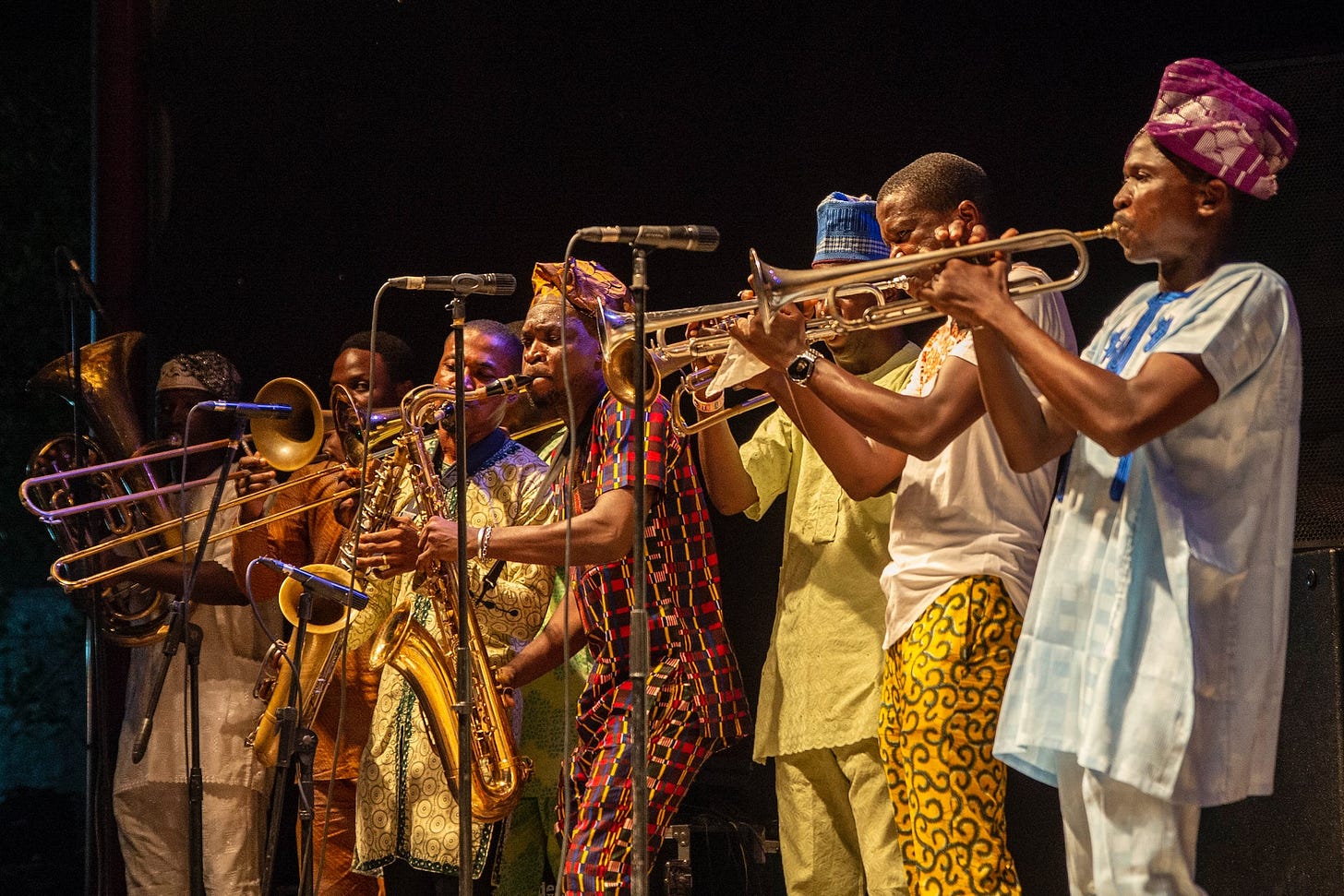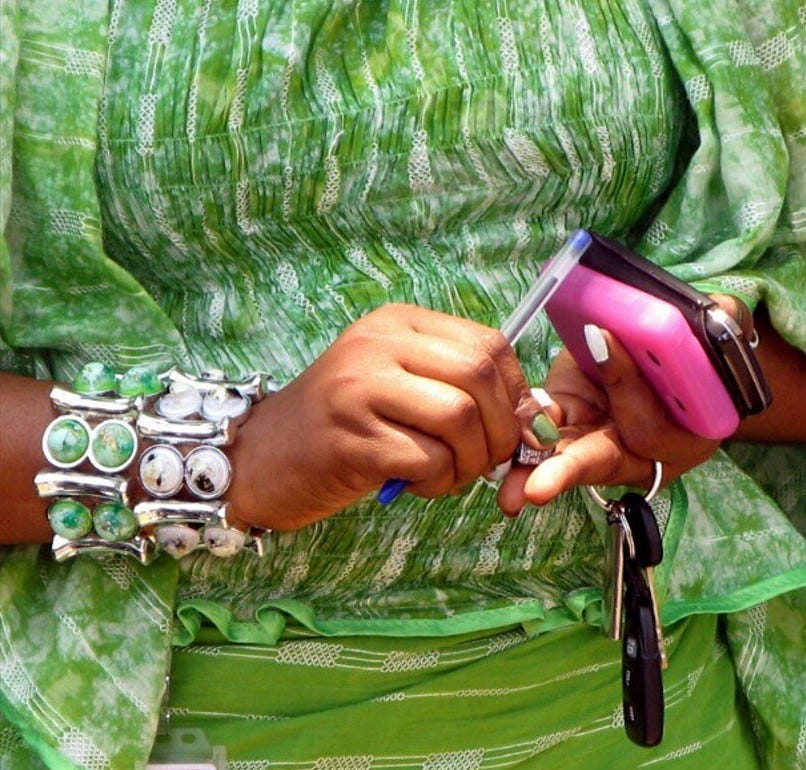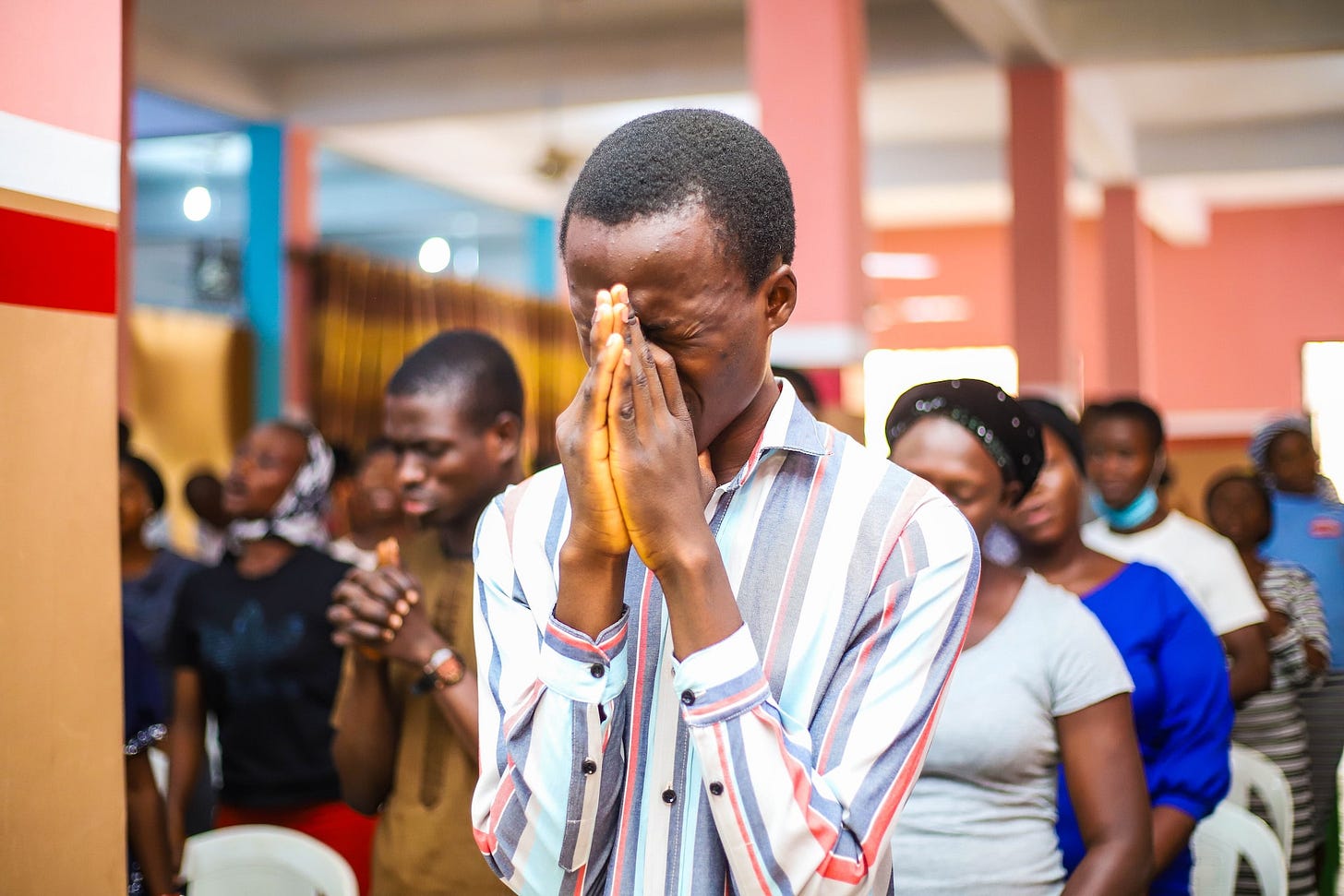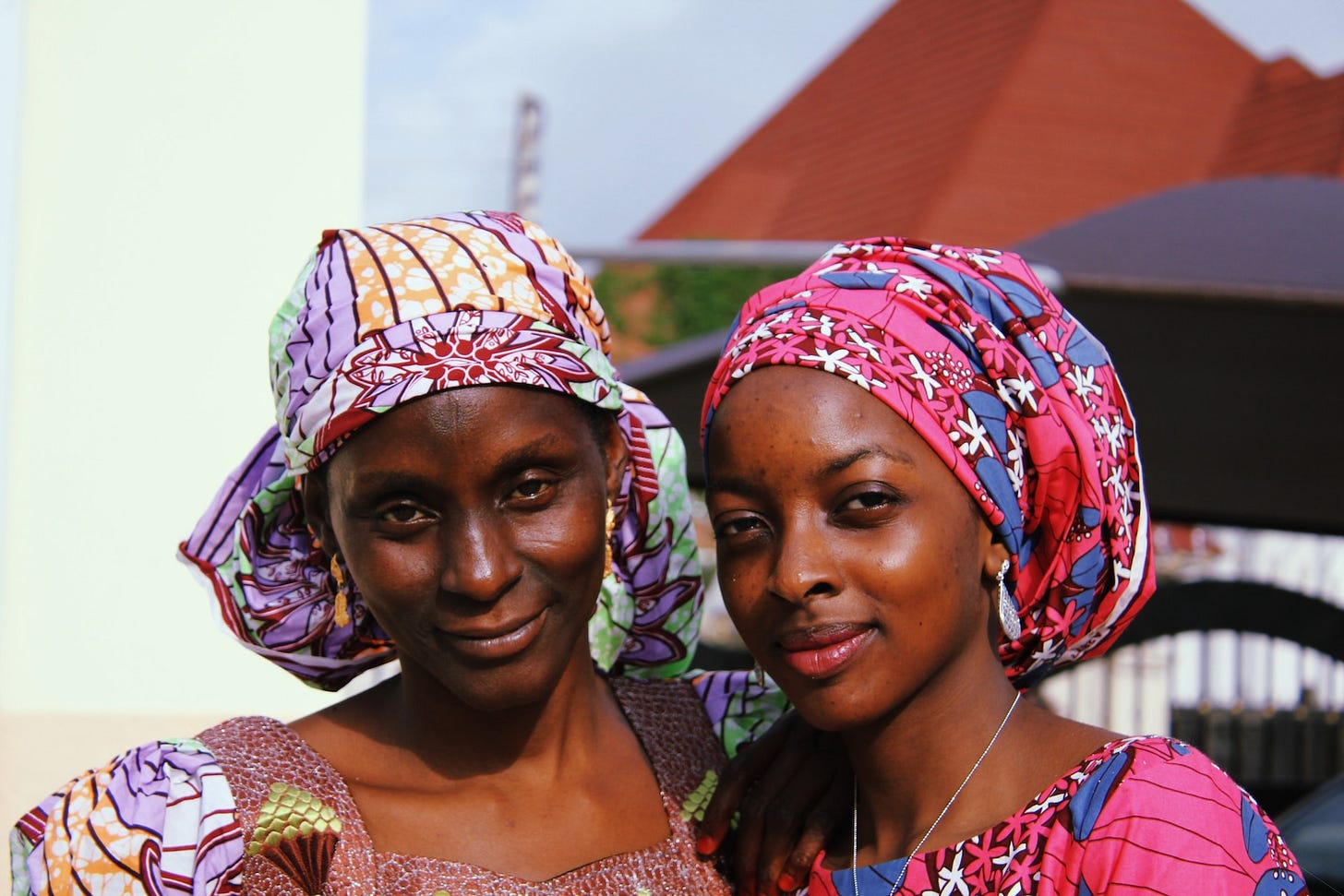Nigeria at 63: Celebrations in a “Desert of No Hope”
It is a work in progress, though one is never too sure whether it is being assembled or torn apart.

In this long read post, I share my perspectives on my country at 63.
Everywhere we go we tell people we are independent, but we haven’t done anything with it
Independence Day Celebration
The air was charged. Electric.
On that day, the children’s pre-class morning choir was on as usual. But this time around, the tempo was higher than during the previous school days. On most of those days, their singing time, often last for about half an hour. Many a sunrise finds me humming along with them from my bedroom.
Today’s piece was unfamiliar. Some of the voices were in tune while others were discordant. Streaming excitedly, their innocent voices were up by several pitches.
I was awake at my desktop throughout the previous night - coaxing words from the keyboard to show up as sentences on my desktop. Dawn found me saying "good night" while other members of my household were prepping to usher themselves into the new day.
Up from bed, I almost forgot about my first appointment for the day. I hurriedly set out to catch up with my pal a few blocks away.
Their “march-past” take-off point was the gate into their nondescript school. I caught up with the pupils, stopping by the side to catch the lyrics of their new song. My attention was immediately arrested by grotesque vertical paint marks on their faces. None of them was exempted.
Speechless, I questioned, “What is up?” A big white, green, white flag with the country’s coat-of-arms stamped in the middle of the white was conspicuous even from scores of meters away. They all had their cheeks painted in streaks of green with thick white lines running down their foreheads via their nose-bridges.
To me, the grotesque paint marks disfigured their lovely faces, turning them into mini-monsters. My consolation was in knowing those painted faces won’t last for more than an hour.
“What’s up?” I repeated my query. To no one in particular.
My “Aha” moment finally dawned. Our country’s Independence Day was two days ahead. They were rehearsing for our "faded glory" on October 1st Celebration.
Standing aside and watching briefly, I snapped some still and video shots with my smartphone before proceeding to my rendezvous.
I shook my head as I marched off. The children and their minders were vigorously marching and stamping their feet on the cobbled muddy driveway. Their shrilling voices drowned out all other noise around.
On 1st October 1960, Nigeria got independence.
On 1st October 1960, Nigeria got independence.
Freedom, freedom, freedom, freedom … … (repeat)
I was once like them before slipping through the nets of childhood and innocence. Compared to my own times over five decades ago, the Nigeria of these kids' childhood days is what no sane citizen would ever wish for their children.

Ours is a rancorously religious country. Unfortunately, many Nigerians live and act contrary to the moral tenets of their religions.
These days, through suffering and smiling, Nigerians have coined a veritable prayer point - "May Nigeria never happen to you." You must say amen to that, because "When Nigeria happens to you, you will know." Of course, these are bitter ironies with meaty kernels of truth.
You had better watch out.
Yet, deep within, many Nigerians refuse to wake up to the irony of a people daily praying for the good they are assiduously working hard to ensure never happens. Not only must we work and pray, but if our prayers are to work or do us any good, we must repent and change our ways. But will we?
Yet, deep within, many Nigerians refuse to wake up to the irony of a people daily praying for the good they are assiduously working hard to ensure never happens. Not only must we work and pray, but if our prayers are to work or do us any good, we must repent and change our ways. But will we? .
We must insist on truth, equity, fairness, and justice. Anything otherwise amounts to scattering with one hand what one is trying to build with the other. God Almighty is not obliged to intervene to save people who are working against their own deliverance.
A Harvest of Broken Shells
Sixty-three years after independence, what do Nigeria and Nigerians have to celebrate?
In the mid to late 1970s, my age was the average of these kids in the primary school. Nigeria was under the booth of military rulers then. Independence Day was a time for proper celebration.
Back in those days, they usually reserved rice for special occasions in many homes. But come to Independence Day, they served school children sumptuous rice lunch packs to mark a real and jovial celebratory atmosphere. Life was hard and gruel, especially for rural dwellers. But, compared to Nigerians hardy life of 2023, those were really good-old-days.
Today, sixty-three years after independence, majority of Nigerians can no longer afford to eat “common” rice.
Despite all the glitz and glamour that a recent visitor a recent visitor to our shores may be greeted with, what we’ve experienced these past six decades has been a disorderly illusion of progress. As a country, we have retrogressed more than we’ve progressed.
Days of reckoning are now at hand. Compared to where we are coming from and what many middle-aged, and now, elderly Nigerians experienced in the past, we are several orders of magnitude worse than when we gained our independence. No thanks to successive parades of rulers. Many of them have been visionless and only in power to enrich themselves and their tribesmen.

Joining the Marching Band
My meeting venue was about 5 minutes walk. My friend was already seated, attending to some guests with glasses of herbal drink in the sit-out of his modest house. I joined the other guests, But I didn’t have to wait long before my phone rang out.
A prospective customer for a hustling opportunity was on the line. I’ve been pursuing this deal for several weeks. Now, he was awaiting my arrival at his office. I excused myself and raced home from where I set out. Business was in the air. Or was it? Time shall tell.
The main road was about half a kilometer away. Taking off from home to go catch a taxi, I again encountered the pupils' marching band. The fuel station at the end of the road was their destination.
Upon their arrival there, they shifted to one side of the busy narrow motorway. First, they sang their freedom chant. Next, they sang the two stanzas of our country’s National Anthem. (I only know the first stanza). Finally, they sang their school anthem before resuming their chant and marching past on their return trip back to their school.
For many Nigerians like me, the Independence Day celebration holds no appeal. What could any sane Nigerian be celebrating when our land is being constantly trailed by hunger, unemployment, bloodshed, violence, and the ever-dwindling purchasing power of our currency – the naira?
Once, while in the United States, I had to be reminded by an American lady of my country’s Independence Day as she congratulated me with “Happy Celebrations.”
For their greed, they plundered their children's inheritance
In 1997 marked my first trip to Scotland. I was on a company-sponsored work-related training. While there, I went on an excursion - out of Montrose to Edinburgh.
As part of the tour, we visited historic Edinburgh Castle, both the city and its iconic landmark offered a plethora of historically unforgettable sights. Among these, one image has lingered indelibly in my memory.
The timeless steadfast oak wood (?) seat can accommodate three to five adults.
Stamped at its back was a cenotaph plaque reminding visitors of past history they ought to never forget.
It reads,
WHEN YOU GO HOME TELL THEM OF US AND SAY “FOR YOUR TOMORROW WE GAVE OUR TODAY.
I sat down reverentially and briefly on this hallowed seat as my Danish colleague (I can still recall his name.) took snapshots with my Olympus point-and-shoot camera.
The epitaph commemorates the heroic and ultimate sacrifices paid by soldiers who died in Burma while fighting for the British Empire during World War II.
The epitaph ended with, IN MEMORY OF COMMONWEALTH FORCES WHO SERVED IN BURMA, 1941 – 1945
I read on, struggling hard to restrain and hold back tears.
My grandfather far back in colonial Nigeria, never fought in World War II, but he used to regaled his household with about it. Adding to the knowledge gained from my reading, I knew a thing or two about that war right from my teenage years.
Deserving as they are, my subdued tears were not for the long-gone British heroes. As I read that epitaph, what immediately came to my mind was a book written by one of Nigeria’s military rulers. Book title, “For Their Tomorrow, We Gave Our Today". – Selected Speeches of IBB.”
No, I’ve not yet read the book and therefore I can’t be prejudicial.
On that day at Edinburgh Castle, my discovery was an epiphany.
“So this is where IBB got the title for his book. But instead of moving our country forward and better, he left the country worse than he met it ….”
To me and many Nigerians, IBB was a faux intellectual military president. In the opinion of well-informed Nigerians His rule and many of his policies wreak havoc on Nigeria’s psyche.
A high body-count of politicians, willing accomplices, and their plundering rulers has bedeviled Nigeria and the whole of Black Africa. These are the wasters who have prodigally gluttonized Nigeria’s common weal. Now there is no more rice for their children and future generations to rice to eat.
These are mis-rulers who for their greed and lack of vision, plundered their children’s and grandchildren’s inheritance.
Speaking about IBB in his book, Karl Maier, the author of This House Has Fallen, quoted a highly acclaimed former Inspector General of Police M. D. Yusuf as follows;
“I think Babangida was even worse than Abacha,” I was once told by M. D. Yusufu, the highly respected former inspector general of the police. “Babangida went all out to corrupt society. Abacha was intimidating people with fear. With him gone now, you can recover. But this corruption remains, and it is very corrosive to society.”
Babangida was the dominant political character of his governing era.
One only wonders what M.D. Yusuf will say today of buccaneering rulers and enablers who subscribe to the doctrine of mammon and filthy lucre - “What money cannot buy, more money wiNigeria - 2023
If you’ve never experienced, seen, or felt it, you may not believe it.
But it's true.
Apart from the civil war years, Nigerians have never experienced as many torrents of concentrated hardships as they have in 2023 alone.
Hunger, famine, and poverty hold sway in the land, menacing, and wasting Nigerians in installments. In real-time. Daily.
And with no end in sight.
They (and we) have turned our country into a “desert of no hope.”
Premium Motor Spirit (PMS) or petrol, is Nigeria’s primary source of energy and for fuelling vehicles. For a nation with rich endowments of natural energy resources, Nigeria is one of the most energy-starved countries in the world.
In 2021, Nigeria's per capita electricity generation stood at an average of 147 kilowatt hours. (Source: Statista.com). In 2022, similar data for France was 6,300-kilowatt hours (Source: enerdata.com).
Contrary to what meets the eye, the people ruling us seem not to believe that their people deserve good things and better living standards. Ironically, many of the people they misrule seem not to believe that they deserve better things and better lives either.
Why is this so?
Because, election after election, our politicians major in weaponizing poverty, ignorance, and religious differences. Instead of striving to unite and make our lives better than when they met us, they exploit our tribal differences to entrench more destructive cleavages.
Our politicians and rulers have weaponized poverty.
In less than 5 months (May to September 2023), the pump price of petrol has increased from N180 to over N700 per liter (that is a 400% increase) and it is still stirring to increase further.
In some places, transportation costs have increased by up to 200% in some places. No thanks to the falling value of our naira. Due to years of cumulatively disastrous economic policies, the national currency has been racing towards worthlessness.
Between 30 April 2023 to 23 June 2023, the official exchange rate nosedived from N457.91 to N823.1 to the dollar. (Source: exchangerates.org.uk)
The official exchange rate is N770 to a dollar. The unofficial rate is N1000 as of September 29, 2023.
Even though Nigeria is not a United States territory, everything here is priced (directly or indirectly) in dollars. And with wild unexpected drastic exchange rate swings like Nigerians are experiencing now, living and surviving in Nigeria has become an ever-worsening nightmare.
Nigerians have been so bruised and battered by their rulers that they have no strength to cry or offer any resistance. Don't be deceived by appearances. Yet, no matter how dismal their scorecards are, all past governments are instantly rated higher than the current one. Why? Because our people haven't experienced any modicum of life-changing impacts from the new government in power.
As a people, Nigeria seems to have a high body-count of people afflicted by collective amnesia.
There has been some progress, but ours has been a disorganized illusory progress.
Nigerians have access to the most expensive Androids or iPhones, but there is no regular public power supply to charge them. The government, especially at the state and federal levels, purchased bullet-proof cars and use the police to chase their people out of bomb crater-like roads they refused to fix.
What are the people expecting from their government? basic things like good roads, security, basic health infrastructure, education, jobs, and employment ….
Nigerians are easy to please, and quick to forget past mis-governance.
Any ruler who cannot make noticeable, relevant, and sustainable changes in the lives of our people's lives is worse beyond comparison.
And how can the government even make or change their people’s lives for the better? The people don’t even have a uniform definition of what is good or bad/?
Many Nigerians don’t worry about who stole or what was stolen.
The aspirant to the throne may be a known crook and swindler, with the morality of a dog and the integrity of a scorpion.
If the thiefing ruler is from their party, tribe, or religion, crime or corruption is forgiven and sanctified. Plain-sight-known cases of corruption are often swept under the carpet and the people are urged to carry on as usual even when they know that things are not OK.
A high-ranking politician has been reported to have infamously quipped that any corrupt politician who reneged his party to join the party of the government in power would be forgiven all their past proven or alleged misdeeds.
In Nigeria, there is no uniform standard of truth, right or wrong. Ours has turned into an Orwellian doublespeak country where evil is certified good according to our political immorality..

On the hustling run
From my house to the oil services sector of Port Harcourt used to cost N200 for a round trip. Now you must eke out N300 for the same trip or else stay stuck and even more hungry at home.
As my friend, Tony Alika, astutely captured the pervasive rottenness of the Nigerian system on one of his Facebook posts;
Nigeria is a nation with amazing opportunities. I mean, there is so very little in place by way of infrastructure and services that this is an investor's dream, or so it seems. This is one clean slate. No need to think of high tech as the most basic things that don't exist.
• No waste disposal.
• No water supply.
• No good health care.
• No roads
• No textile industry
• No public transportation system
• No housing system
• No security
• No power
• … …
The list is endless.
One would think a quick way to make it would be to just get in and grab any of these lacks and provide a solution.
The moment you try it, you'll realize the situation has been left the way it is for a purpose;
The decay gives life to some people.
The rot is an industry bigger than the solutions.
No sooner have the politicians rigged, and trampled their subjects on their way to the top than they start calling for prayers for the country’s new conqueror at the top.
Suddenly the new government appointees begin to call for unity.
"We must unite as one."
"Nigeria is our only home. We have no other place to go."
"We must all work together to make Nigeria great… …" and more ad nauseam.
Hearing these insincere people will evoke nausea from any person. My typical reaction is to flee. Most of those uttering these high-sounding utopian-speak do not believe in what they are saying. Neither are they working towards their actualization.
They want to build a nation on a foundation of lies, injustice, inequity, and foul play.
Has any house ever stood that was built on a foundation of quicksand? Well, may this country stand that is being built on such as worse foundations of miry clay.
Stupidity by the Numbers
Why will people do these to themselves?
Why do our rulers choose to lead the country on the down-spiraling pathway to self-immolation?
And above all, why do our people seem to prefer to have it so even when we know it will only lead to our self-destruction? Only one thing can be responsible for that.
Stupidity.
Yes, stupidity to a collectively massive extent.
The problem with Nigeria is that almost every Nigerian will accept that the problems with Nigeria are every other Nigerian's fault but theirs.
We do stupid things, make foolish choices. Afterward, we start calling for unity and praying to God for deliverance.
God save Nigeria.
If you are God, will you save Nigeria? How will God save a head-to-toe rotten country that refuses to repent and change their ways?
What God’s righteous prophets declared to the ancient nation of Israel is still true today. True for both individuals and nations.
14 if My people who are called by My name will humble themselves, and pray and seek My face, and turn from their wicked ways, then I will hear from heaven, and will forgive their sin and heal their land. 15 Now My eyes will be open and My ears attentive to prayer made in this place.
2 Chronicles 7:14-15
For the past many years, it seems a plague of zombies of stupid people have overtaken Nigeria.
Bonhoeffer's Theory of Stupidity best explains the banal complicity of many Nigerians in their own undoing.
As explained by author Jonas Koblin in Sprouts Schools online,
"In the darkest chapter of German history, during a time when incited mobs threw stones into the windows of innocent shop owners and women and children were cruelly humiliated in the open; Dietrich Bonhoeffer, a young pastor, began to speak publicly against these atrocities.
After years of trying to change people’s minds, Bonhoeffer came home one evening and his own father had to tell him that two men were waiting in his room to take him away.
In prison, Bonhoeffer began to reflect on how his country of poets and thinkers had turned into a collective of cowards, crooks and criminals. Eventually he concluded that the root of the problem was not malice, but stupidity.
Dietrich Bonhoeffer argued that stupid people are more dangerous than evil ones. This is because while we can protest against or fight evil people, against stupid ones we are defenceless — reasons fall on deaf ears.
It becomes apparent that every strong upsurge of power, be it of a political or religious nature, infects a large part of humankind with stupidity. Almost as if this is a sociological-psychological law where the power of the one needs the stupidity of the other.
The fact that the stupid person is often stubborn must not blind us from the fact that he is not independent. In conversation with him, one virtually feels that one is dealing not at all with him as a person, but with slogans, catchwords, and the like that have taken possession of him.
He is under a spell, blinded, misused, and is abused in his very being. Having thus become a mindless tool, the stupid person will also be capable of any evil – incapable of seeing that it is evil ... …
Here lies the crisis of stupidity as manifested in our people. Collectively, we all know what the right choice is, but we allowing ourselves to be captives used by unconscionably evil demagogues.
Many of Nigeria’s influential religious leaders started fall over themselves, succumbing at the altars of these same rulers who had been holding the country captive for years. Indeed, many Christian religious leaders are reluctant to rock the boat. Otherwise, why are many of them so quick to be in the good books of any government in power?
The true Israelite prophets of old always reproof and call on their backslidden nation and rulers to repent, turn to God, and rule justly. Unfortunately, many Nigerian pastors renege on this noble calling of speaking for the voiceless. Instead, most of them surrender their pulpits to the ungodly, calling prayers and support for unpopular rulers.

Nigeria’s famine of desperation and “zero hope”
Continuing in This House Has Fallen, Karl Maier wrote,
"Nigeria, like so many countries in Africa, is patently not a developing nation. It is underdeveloping. Its people are far worse off now than they were thirty years ago."
Nigerians spend a good part of their lives trying to get the better of the government for their benefit or that of their family, their village, or their region. Rare is the head of state who acts on behalf of the entire nation.
The people are not so much governed as ruled. It is as if they live in a criminally mismanaged corporation where the bosses are armed and have barricaded themselves inside the company safe.
The present continuous horrifying state of Nigeria has been aptly captured by Brother Barth (@BrotherBarth on X) in his “POVERTY OF HOPE IN NIGERIA” post on X. Itemizing the present continuous sufferings of Nigerians with hope not yet in sight, Brother Barth succinctly captured our harrowing nightmare thus,
Beyond these hardships Nigerians face, the most critical and damning is the poverty of hope. This is near-complete uncertainty of what tomorrow holds. Nothing reduces lifespans faster. Sadly, this is the most terrible epidemic presently in Nigeria.
In a previous post, I wrote that the root cause of our problems in Nigeria is our people’s acculturated mindset of, “It doesn’t concern me.” to any negativity that doesn’t immediately impact them directly.
My point is in tandem with Karl Maier’s observation that,
There is certainly much anarchy to be managed in Nigeria, but just doing that—if it can be done—is not enough. The tragedy of the future is that Nigerians refuse to learn from their own past. “We are far more anxious to dismiss what happened than anything else. Nobody wants to get to the bottom of anything.
So long as Nigerians keep journeying on as usual despite all the amount of rascality we see and swim in, this country will keep on sinking irredeemably in self-created mire.
The only path to sustainable hope for future generations is to rediscover the unfailing route marked by milestones of honor and steadfast principles.
Thanks for reading. If you enjoy this piece, support my writing by chipping in to buy me a Substack subscription, here.
Plus, join in the conversation by sharing your insights as notes and restacks.
Source: ©Karl Maier, This House Has Fallen, Penguin, 2000






